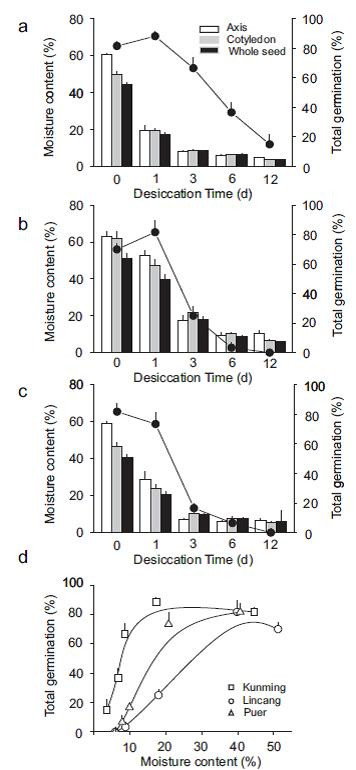Tea is the most widely consumed beverage plant in the world. Because of the likely presence in wild species of traits desirable for plant breeding, it is important to conserve the genetic resources. However, tea seeds can’t be long-term stored at conventional seed bank temperature due to the sensitive of desiccation and low temperature. The assignment of tea seed storage biology has been the subject of dispute as the response to desiccation has varied with seed lot, although the reasons for such variability have not been resolved.
Dr. CHEN Hongying, from Germplasm Bank of Wild Species collaborated with English seed experts from Seed Conservation Department, Royal Botanic Gardens, Kew, assessed the ability of tea (Camellia sinensis (L.) O. Kuntze (Theaceae)) seeds from three sites (Kunming, Lincang and Puer) in China to germinate after desiccation during 2007 to 2010. The results indicated that desiccation tolerance was greatest in Kunming, followed by Puer and Lincang, with Kunming seeds tolerating drying to 8% moisture content (MC), or ~0.5 water activity. The different desiccation tolerance was related with the environment where the plants were growing and variation among species. When hydrogen peroxide (H2O2) at 0.5 or 1 M was applied to seeds, post-desiccation germination was improved. The desiccation experiments and the length of the dry season after dispersal and the high ratio of seed coat to seed mass (>0.3) all indicated that seeds from all three sites were not recalcitrant. Even after high survivalon drying to 10-13% MC, no Kunming seeds tolerated 1 month storage at -20°C coinciding with lipid transitional changes at this temperature. The results indicate that tea seeds from China are neither recalcitrant nor storable at -20°C.
This study has been recently published in Plant Science (Chen H.Y., Pritchard H.W., et al., 2012, 184: 36-44) http://www.sciencedirect.com/science/article/pii/S0168945211003438. This work was supported by the 100-Talents Programme of CAS to WL and by the Millennium Seed Bank Project with funds from the Millennium Commission, The Wellcome Trust, Orange Plc. and Defra. The Royal Botanic Gardens, Kew, receive grant-in-aid from Defra. HWP thanks the Chinese Academy of Sciences for the award of a visiting Professorship for Senior International Scientists (Grant No. 2010T2S04).

Effect of drying on C. sinensis seed germination. (Image by KIB)




